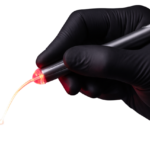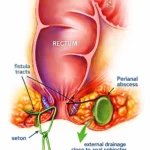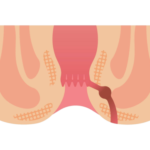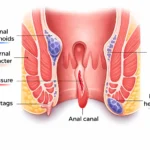If your doctor has recommended surgery for your fistula, you will find some of the best hospitals and top gastroenterologists in Bangalore. When it comes to undergoing medical treatments, most of us worry about the cost of treatment. The cost of surgery for conditions like a fistula depends upon several factors like the severity and the type of surgery.
Regardless of these factors, the cost of fistula surgery in Bangalore is affordable. Before understanding how fistulas are treated, let’s know what a fistula is!
What is a fistula?
Most people with fistulas are unaware of their condition until their signs and symptoms become evident. Due to generalised symptoms, diagnosing fistulas may be challenging.
A fistula is an abnormal connection between two organs or blood vessels that are not usually connected. Though a fistula can develop anywhere in the body, the most common one is around the anus. According to the WHO, around 50,000 to 1,00,000 cases of fistulas are reported worldwide each year.
Fistulas are usually formed as a result of:
Injury
Infection
Surgery
Inflammation
Fistulas can be of the following different types:
Blind: Opens only at one end and connects to two structures
Complete: A tube with openings inside and outside the body.
Horseshoe: Connects the anus to the skin’s surface, going around the rectum.
Incomplete: Usually begins from the skin and is closed on the inside. It usually does not connect to any internal structure.
Understanding the financial aspect of treatment is a crucial step in your recovery journey, but early intervention is equally vital for long-term health. Recognizing common fistula symptoms—such as persistent anal discharge, recurring abscesses, and throbbing pain near the rectal area—can help you seek medical advice before the condition becomes complex. By addressing these signs early, you not only improve the success rate of the procedure but also gain the opportunity to learn how to prevent an anal fistula through proactive lifestyle changes and proper digestive care.
While many patients hope for a non-surgical recovery, it is important to understand that an anal fistula is a complex tunnel connecting the anal canal to the outer skin that rarely resolves without medical intervention. Many people often wonder, can a fistula heal on its own; however, because the tract is constantly exposed to bacteria and movement, it typically requires professional treatment to close properly. Delaying care can lead to recurrent abscesses or more complicated branching tracts, making early diagnosis and surgical intervention the most effective path to permanent relief. Understanding the procedure and associated costs can help you make an informed decision for your long-term colorectal health.
What are the signs and symptoms of a fistula?
The signs and symptoms of a fistula usually depend upon where it is located in the body. Fistulas cause uncomfortable, unpleasant and embarrassing symptoms.
A few common symptoms of fistulas are:
Pain
Redness
Swelling around the anus
Fever
Painful urination
Painful bowel movements
Abnormal, foul-smelling fluid leakage from the anus
Irritation of skin around the anus
Difficulty in controlling bowel movements (incontinence)
Rectal bleeding
Some symptoms specific to the fistulas in the following areas include:
Fistula between the small and large intestine
Diarrhoea
Passage of undigested food in stools
Fistula between the intestine and the bladder
Urinary tract infections
Burning during urination
Cloudy urine
Blood in urine
Fistula between the intestine and the vagina in women
Passage of gas or stool through the vagina
Abnormal or foul-smelling vaginal discharge
Fistula between the intestine and the skin
Initially presents as a painful lump or boil
Skin abscess that may drain foul-smelling fluid or stool
How is a fistula treated?
If you have one or more of the above symptoms, you may have an anal fistula that requires medical intervention. During your doctor consultation, they will perform a thorough physical examination using a gloved finger to check for signs of a fistula.
If your doctor suspects a fistula, they might recommend the following diagnostic tests:
Proctoscopy: A small telescope-like device with a light at its end is inserted into the anus to visualise the area
Imaging tests: CT scan, MRI or an ultrasound scan
Fistulas do not heal by themselves and require professional treatment. There are several treatment options for fistulas, and your doctor evaluates your condition to determine the most suitable one for you.
Most fistulas require surgery; however, the first treatment step is usually treating the infection with antibiotics.
Before learning about the cost of fistula surgery in Bangalore, it is essential to understand the various treatment options and types of surgeries performed.
For simple fistulas far from the anus, the surgeon will create a tunnel by cutting through the skin and muscle. This simple surgical procedure aims to allow healing from the inside out. A plug may be used to close the fistula.
In the case of complicated fistulas, a tube called seton is placed inside the opening to enable the draining of the infected fluid before surgery. The drainage may be allowed for as long as six weeks.
The most commonly used surgical interventions for treating fistulas include:
Fistulotomy: This procedure involves cutting the entire length of the fistula and encouraging it to heal into a flat scar. This is one of the most effective approaches to treating fistulas near the skin surface.
Endorectal advancement flap: This surgical procedure is performed to cover the internal opening of a fistula. During this surgery, the internal fistular opening is covered with a small flap of a healthy bowel wall removed from the rectum.
Based on the type of procedure recommended, you may require an overnight or a few days’ stay at the hospital.
What happens if a fistula is untreated?
In several cases, the lack of awareness, not diagnosing the condition or the high cost of treatment results in a serious condition being left untreated. Fistulas are one such condition that cannot be left untreated and do not heal by themselves.
Leaving a fistula untreated results in complications like:
Faecal incontinence
Recurrence
Increased risk of cancer
If you are experiencing one or more symptoms that may be indicative of a fistula, contact a specialist at theSmiles Institute o f Gastroenterology to book an appointment today!
Dr. Parameshwara CM is a global authority in Coloproctology and the visionary founder of SMILES Hospitals, with an extraordinary track record of over 50,000 successful surgeries. A true pioneer in the field, he was the first to introduce Advanced Laser Piles Treatment and sophisticated procedures like LIFT, VAAFT, and STARR to Karnataka, revolutionizing the way digestive disorders are treated. He combines surgical precision with state-of-the-art laser technology to offer bloodless, minimally invasive solutions. Call us: +9108099008800 for further help.








